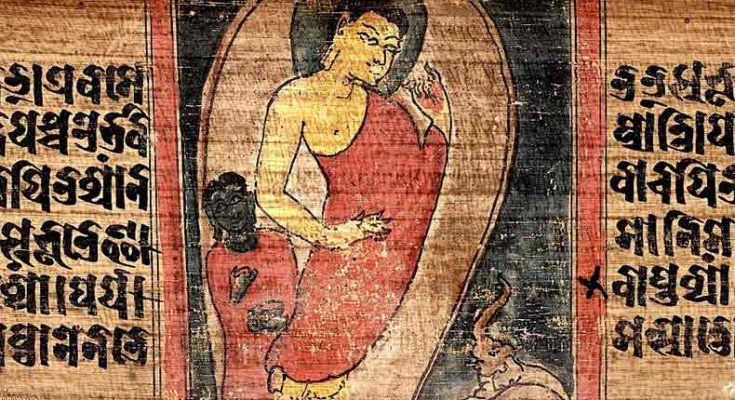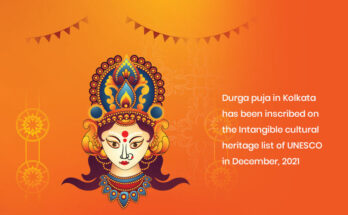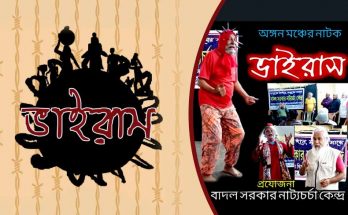Character in Buddhist Literature – an analysis by Prof. Dr. Koosal Sen. Image Courtesy – BDRC Library
Buddhism is not a fear-based, controlling religion. It’s a love-based, empowering way of building character and Life. The more you can feel the depth of pain, the more you can transform that pain into joy and ecstasy. Buddhist practice puts you in a higher life condition that has lasting value. Power ends where fear begins and faith is to fear nothing, thereby awakening to a higher purpose in life. So, the character in Buddhist literature has to be understood delicately.
Almost every religious text confirms that a human being is especially gifted to able to think, reason, and choose a path of action to achieve this purpose. Supreme power grants life as a human being as a gift to enable a soul to reunite with him through faith and devotion.
The time following Buddha’s death is grouped into three consecutive stages-‘the former day,’ ‘middle day’ and ‘latter day’ of the law. The period following Shankyamuni’s death with the former day and the middle day of the law each lasting 1000 years, followed by the letter day of the law lasting indefinitely for more than 10,000 years. These three times are periods in terms of teaching, practice, and proof of Buddha’s teaching. During the former day of the law, the pure spirit of Buddhism remained intact and people enjoyed the benefit of their practice. During the Middle day of the law, people enjoyed the benefit of their practice, Buddhism flourished in society but the vibrant humanism of Buddhism began to decline, thus fewer people were benefitted through their practice.
Therefore at the beginning of the latter-day, a Buddhist monk named Nichiren Daishonin on April 28, 1253, established the chanting of “Nam-myyoho-renge-Kyo” as the very basic practice to enable all people to attain enlightenment.
Read: Religion & religious saints of India – part 12 (Bamakhepa)
‘Nam’ derives from the Sanskrit word name or names, meaning to derive ourselves to one’s life or to dedicate one’s life.
‘Myoho’ is the mystic law, which means the mysterious nature of our life from moment to moment.
‘Renge’ means the lotus flower which blooms and produces seeds at the same time. Thus it represents the simultaneity of cause and effect.
‘Kyo’ literally means sutra, voice, or teaching of Buddhism. Kyo indicates the unchanging truth throughout the three existence of past, present, and future.
Our lives are constantly changing & we always experience a range of emotions from moment to moment. Buddhism explains the concept of ‘Ten worlds’. These ‘worlds’ represent ten life states that a human being can be at any given point of time through which human characteristics are grown up. These are Hell, Hunger, Animality, Anger, Humanity, Heaven, Learning Realization, Bodhisattva, and Buddha-hood, ordered from the least to the most desirable.
The world of Hell – this state is characterized by extreme suffering and despair in which one feels completely helpless.
The world of Hunger – It is a state of being dominated by an endless selfish desire for wealth, fame and pleasure that can never be satisfied.
Read: Religion & religious saints of India – part 11
The world of animality – It is driven by instinct and lacking in reason, morality, or wisdom, where one fears the strong but bullies the weak.
The world of anger – In this state awareness of ego emerges leading to excessive pride which prevents us from revealing one’s true self.
The world of humanity – This is a tranquil state marked by the ability to reason and make calm judgment where one tries to control one’s desire and impulses with reason.
The world of Heavenly beings – a state of joy & contentment experienced when one’s desires are fulfilled or one is relieved from suffering.
The world of Realization – in this state one tries to free oneself from the suffering by seeing some truth through our ’s non-observation and effort.
The world of Buddha-hood – It is a state of completeness and true freedom, in which one is able to savor a sense of unity with the fundamental life – force of the universe.
The world of Bodhisattwa – is a state of compassion in which one thinks of and works for the happiness of others.
But what is significant in Buddhism is that the study of these is restricted is a learned few. The word ‘belief’ is a firmly held opinion or conviction. It may be a trust or confidence in something that cannot be proved immediately. It may come from religious faith through use and experiences. Customs can also be interpreted in a different way. It could mean a traditional way of behavior or a habitual practice or a way of acting in given circumstances. The habitual activity could be transmitted from one generation to another that gradually leads to build the character of a civilized nation.
Understanding significance of the character in Buddhist literature is incomplete without a quote of Gautama Buddha. He said, “It is better to conquer yourself than to win a thousand battles. Then the victory is yours. It cannot be taken from you, not by angels or by demons, heaven or hell”.





